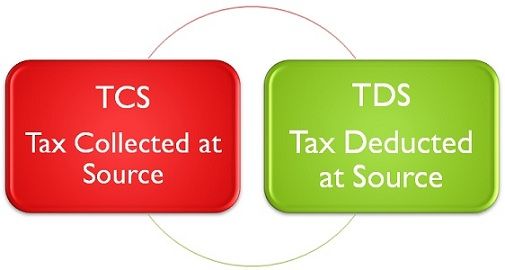 In Income Tax, an assessee’s total income for the previous year is taxable in the assessment year. Although there are certain provisions in the act, through which, the recovery of tax on income, is possible in the previous year itself, i.e. through TDS, TCS, and payment of advance tax. If you are not able to tell the difference between TDS and TCS, you are not the only one. While TDS is an expense, TCS is an income.
In Income Tax, an assessee’s total income for the previous year is taxable in the assessment year. Although there are certain provisions in the act, through which, the recovery of tax on income, is possible in the previous year itself, i.e. through TDS, TCS, and payment of advance tax. If you are not able to tell the difference between TDS and TCS, you are not the only one. While TDS is an expense, TCS is an income.
TDS stands for Tax deduction at source, TCS expands to Tax collection at source. These are not taxes but are an obligation, which is deducted at the time of payment or received more and deposited to the Income Tax Department. To help you out, in comparing and contrasting these taxes in detail, we have compiled an article for you, have a look.
Content: TDS Vs TCS
Comparison Chart
| Basis for Comparison | TDS | TCS |
|---|---|---|
| Meaning | TDS implies the amount deducted from the recipient's income in the form of tax. | TCS refers to an amount accumulated by the seller or company as tax. |
| Nature | Expense | Income |
| Imposition | Specified expenses crosses the prescribed limit. | Sale of specified items is made. |
| Responsible person | Deducted by payer or buyer | Collected by payee or seller |
| Occurrence | Crediting the account of the payee or during payment, whichever is earlier. | Debiting the account of the buyer or during receipt, whichever is earlier. |
Definition of TDS
Tax deducted at source or TDS, as its name suggests, is an indirect way of collecting the tax, wherein the collection of revenue at the recipient’s income. It integrates the notion of ‘pay as you earn’ and ‘collect when it is earned’, as a result of which, the collection of tax is brought forward. As per the Income Tax Act, any payment on certain expenses, which falls under the ambit of TDS, are to be paid after the deduction of specified percentage.
In short, at the time of making payment, the payer withheld a certain percentage of the amount and deposited it with the government. In this way, the tax on income is charged in advance, rather than on a later date and the recipient get the net amount, i.e. after TDS. Some examples of expenses for which TDS is charged are salary, casual income, interest on securities, payment of rent, payment of fees, payment of commission or brokerage and so on.
Definition of TCS
In India, on the sale of certain items, a tax is collected by seller or company at prescribed rates from the payer or buyer of the specified category of items, called as Tax collected at source or TCS. The seller then transfers the tax collected from the purchaser to the government and issue a TCS certificate, for which the buyer of such goods will get credit.
Such items include tendu leaves, liquor (alcoholic nature), scrap, parking lot, toll plaza, bullion (over two lakhs), jewellery ( over five lakhs) and so forth. The rate of TCS is different for different items.
Key Differences Between TDS and TCS
The difference between TDS and TCS can be drawn clearly on the following grounds:
- TDS implies the amount deducted from the recipient’s income in the form of tax. TCS refers to an amount accumulated by the seller or company as a tax.
- While TDS is like expense for the company, TCS is income.
- Tax deduction at source is to be paid when specified expenses overreach the prescribed limit. On the contrary, Tax collection at source needs to be collected when the sale of specified items takes place.
- The payer or buyer deduct TDS, i.e. they are required to deduct tax at source. Conversely, the payee (receiver) or seller is responsible for the collection of TCS, at a prescribed rate from the buyer.
- In general, the tax is deducted at source, at the time of crediting the account of the payee or during payment, whichever is earlier. Although, in the case of payment of salary and life insurance premium, it should be deducted, at the time of payment only. As opposed to TCS, which is collected when the buyer’s account is debited or when the amount is received whichever is earlier. However, when the sale of jewelry or bullion takes place, it should be collected when the considered is received in cash.
Conclusion
Tax deduction at source (TDS) occurs at the time of making payment, i.e. it is a deduction from the income of the recipient. On the other hand, Tax collection at source is absolutely opposite of TDS.






Parameswaran TK says
I am a trader Of water treatment plant. I sold a plant to one of my client. While making payment , he deducted 2% of the invoice value and it is appearing in my form 26 AS. This deduction is TDS or TCS
Surbhi S says
It is TDS, as he is the buyer of the plant
Kayna Khatri says
Can you please specify some examples of TCS and TDS so that this completes the distinguish provided by you.
Thankyou!
Ravi Kumar says
Can you please confirm that how many type of % in TDS and TCS.. like job work for the company and individual firm HUF…
Dwarika says
TCS amount excempt for ITR..
because i have TDS 16000 and TCS 10000…so when ITR file benefit of TCS amount return or not
Vicky Goutam says
Can you help me about ‘Role of TCS in case of E-Commerce Operator “
debora says
Great Article. Its really informative and helpful. keep posting with latest updates. Thanks for sharing such a great article!